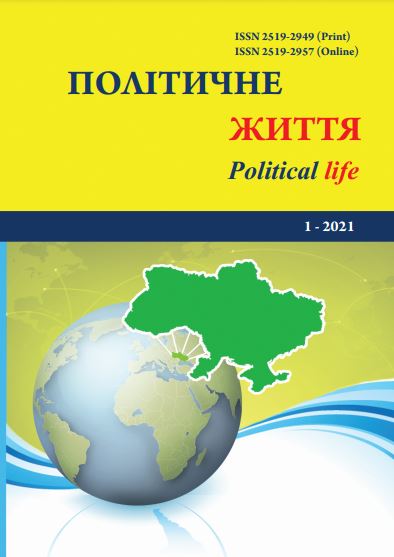The Relationship Between the Cognitive Approach and Public Policy on National Identity Grounds (on the Example of the USSR and the State of Israel)
DOI:
https://doi.org/10.31558/2519-2949.2021.1.12Keywords:
state national policy; national identification; USSR; State of Israel; cognitive approachAbstract
The paper is devoted to the analysis of the content of the cognitive approach to the interpretation of national identity. The features of the implementation of applied conclusions from this approach to the formation of national policy in the former USSR and in the modern State of Israel are and identified. Despite the different scales of these states, the basis for comparison is the extraordinary national or national-religious diversity of their population and the vital importance of taking into account nationalreligious factors in public policy. The paper outlines the main approaches to understanding nationalism and identifies some of the advantages of this cognitive approach. It is determined that the cognitive approach switches to "formative" and "grouping" activities, in particular classification, categorization and identification, and focuses, to a large extent, on the worldview of ordinary people. The key concepts in determining the nature of social identity are outlined. These include "social categorization", which is a tool for segmentation, classification and ordering of the social environment, "social comparison", which is the process of intergroup differentiation by comparing the characteristics of in-group and out-group, and "social identification". which is the result of social comparison and is determined by the social categories to which individuals belong. It is concluded that in both the USSR and the State of Israel, the basis for identification and self-identification is classification and categorization. They are used for the distribution of prestigious jobs and social positions, access to higher and prestigious secondary education, and so on. However, it is noted that these state classifications and categorizations are based on different grounds – ethnic and territorial nationality in the case of state national policy in the USSR, and religious affiliation (somewhat mixed with linguistic and (quasi) ethnic characteristics) in the case of policy of the State of Israel.
References
Бройи Дж. Подходы к исследованию национализма Нации и национализм / Б. Андерсон, О. Бауэр, М. Хрох и др.; пер. с англ. и нем. Л. Е. Переяславцевой, М. С. Панина, М. Б. Гнедовского. М. : Праксис, 2002. С. 201 – 235.
Брубейкер Р. Мифы и заблуждения в изучении национализма Мифы и заблуждения в изучении империи и национализма / Р. Брубейкер и др. М. : Новое издательство, 2010. С. 62 – 109.
Брубейкер Р. Этничность без групп : монография. М. : Изд. дом Высшей школы экономики, 2012. 408 с.
Вердери К. Куда идут «нация» и «национализм»? Нации и национализм / Б. Андерсон, О. Бауэр, М. Хрох и др.; пер. с англ. и нем. Л. Е. Переяславцевой, М. С. Панина, М. Б. Гнедовского. М. : Праксис, 2002. С. 297 – 307.
Израильское конституционное право Zev Farber : веб-сайт. URL: https://israel-law.com/ru/kpravo/ (дата звернення: 12.10.2020).
Calhoun C. Nationalism. Open University Press and University of Minnesota Press, 2001. 310 p.
Нехаев А. В. Теории наций и национализмов: проблема классификации Омский научный вестник. Сер. Общество. История. Современность. 2016. № 2. С. 36 – 46.
Равицки А. Религиозные и секулярные евреи в Израиле: культурная война Созидание еврейского будущого / под. ред. Б. Лайтмана и М. Брауна. М. : Мосты культуры; Иерусалим : Гешарим, 2001. С. 83 – 108.
Сушков И. Р. Социально-психологическая теория Джона Тернера Психологический журнал. 1993. Т. 14. № 3. C. 115 – 126.
Уолби С. Женщина и нация Нации и национализм / Б. Андерсон, О. Бауэр, М. Хрох и др.; пер. с англ. И нем. Л. Е. Переяславцевой, М. С. Панина, М. Б. Гнедовского. М. : Праксис, 2002. С. 308 – 331.
Хабермас Ю. Европейское национальное государство: его достижения и пределы. О прошлом и будущем суверенитета и гражданства Нации и национализм / Б. Андерсон, О. Бауэр, М. Хрох и др.; пер. С англ. и нем. Л. Е. Переяславцевой, М. С. Панина, М. Б. Гнедовского. М. : Праксис, 2002. С. 364 – 380.
Чаттерджи П. Воображаемые сообщества: кто их воображает? Нации и национализм / Б. Андерсон, О. Бауэр, М. Хрох и др.; пер. с англ. и нем. Л. Е. Переяславцевой, М. С. Панина, М. Б. Гнедовского. М. : Праксис, 2002. С. 283-296.
Чернин В. Этническая карта Израиля: история, проблемы и перспективы развития Хроники Иерусалима. 2010. URL: http://gazeta.rjews.net/chernin2.shtml
Яаков Х. Б. Еврейский вопрос в еврейском государстве. Опыт формирования национального характера современного демократического государства : монография. Иерусалим : Гешарим, 2015. 192 с.
Billig M. Banal nationalism : monograph. London: SAGE Publications, 2002. 200 p.
Hobsbawm E. J. Nations and Nationalism since 1780. Program, Myth, Reality : monograph. Cambridge: Cambridge University Press, 1992. 206 p.
Israel’s Independence Day 2019 / Central Bureau of Statistics. State of Israel. Jerusalem, 2017. 3 p.
McGahern U. Multicultural norms and strategies: Minority policy in an ethnocratic state Mediterranean Politics. 2010. 15(3). P. 415 – 433. URL: https://eprint.ncl.ac.uk/file_store/production/187595/ABBA7D7B-5599- 40F8-993D-BD4A11A73A97.pdf (Last accessed: 12.10.2020).
Sluga, G. Identity, Gender and the History of European Nations and Nationalisms Nations and Nationalism. 1998. Vol. 4. № 1. P. 87 – 111.

